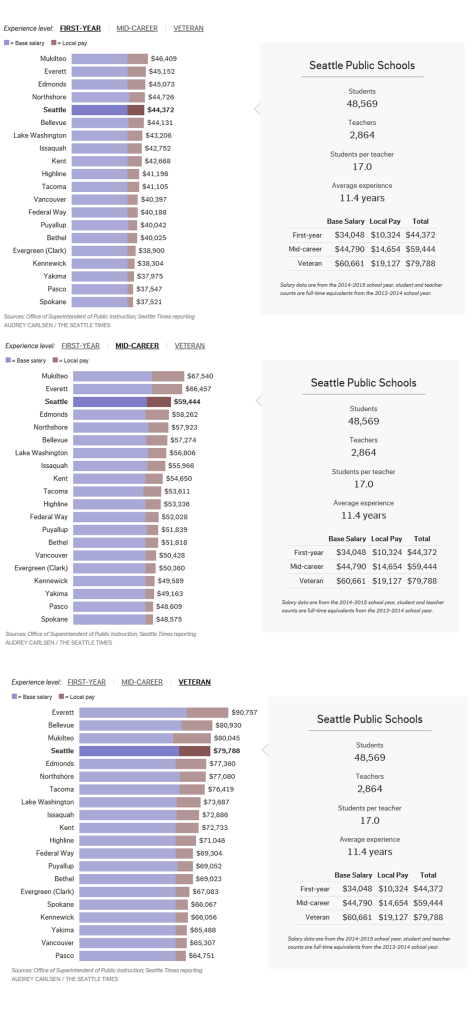“Of the whole McCleary debate, the biggest issue is compensation,” said Chris Vance, former chair of Republican Party.
The Seattle Times interactive chart (left) shows some of the problem caused by our not having Charter Schools.
What is striking is that these are very HIGH salaries for a job the requires a bachelor’s degree from a fairly non competitive major. Also, while $44,372 may not be huge salary for a 12 month job, teachers get the huge benefits of a 2 month vacation, the jobs rapidly become tenured, and the benefits are extremely good.
We know the pay is good because the Pubic School jobs are heavily sought after. Public School teachers are also paid as well or better than their compatriots in private schools.
The pay issue in PUBLIC SCHOOLS results from the unfortunate combination of a shop union model and the treatment of public schools as if they were a utility.
In a public utility the union’s main job is to assure that its workers get good pay. They achieve this by the threat of disrupting an essential public service. The result is fairly high pay for workers in any public utility.
Part of the idea behind charters is to give the school management more control over teacher recruitment. Presumably, the better schools would be able to compete f0r the better teachers. this contrasts with three downsides in the current system:
1. Salaries do not reflect rare talents. A teacher with skills that could also lead to employment in other sectors …foreign languages, science expertise, mathematics can not be paid a competitive wage.
2. Advancement is limited. There is little incentive to advance by demonstrating greater skills. This reflects the teacher union that employ the same labor hall system rather than a system where teachers can compete for higher paid jobs.
3. Regional disparities in pay that do not reflect either the cost of living or the needs of different markets.

Meanwhile, state employee pay lags miserably behind teacher pay. The attorney position I used to occupy in state government paid about $58,000 a year in 1998; as of 2013, it pays about $67,000, roughly 15% higher over a period of 15 years. For decades, the legislature rewarded teachers for striking, and punished state employees for not striking, by taking money away from state employees and giving it to teachers. Why anyone still works for the state is a mystery. Teachers have it good by comparison.
And that is a good thing. Unions do a great job on wages. BUT imagine a legal system where attorneys worked und3er union work rules!
The issue I want to raise here is the “moral hazard” inherent in the Legislature taking money away from state employee COLAs and using it to pacify striking teachers. The message these acts of legislative cowardice sends to state employees is that the only way they can protect their interests is by walking off the job.
True enough. And retirees can not strike.